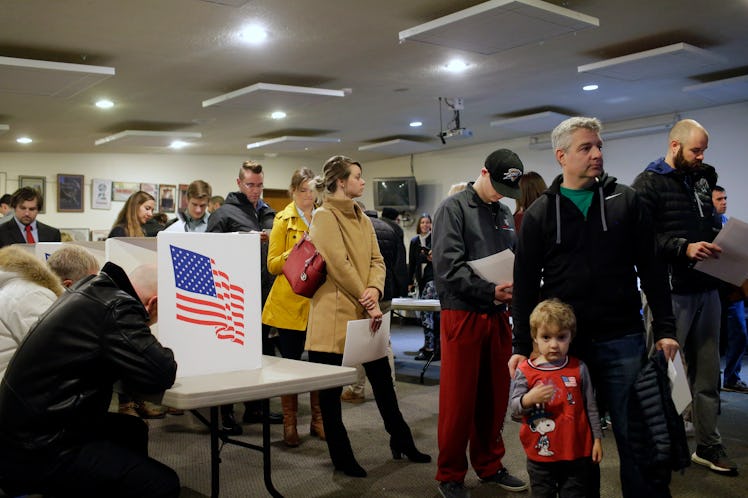
The Electoral College Has A Pretty Major Origin In American Law
As the 2020 presidential election approaches, lawmakers have begun speaking out about not only who should be the next president, but also how they should be elected. Though they admit it would take a lot of work, Democratic presidential candidates and even Supreme Court Justice Ruth Bader Ginsburg have supported removing the Electoral College: an election system that's been in place since the United States first became a sovereign nation. Plus, a solid number of Americans want to reform or abolish it, too. To do that, however, it's important to look back at its history: Is the Electoral College constitutional?
For those who doubt, I have some news: the Electoral College is the most Constitutional, because it's in the literal Constitution. While it never directly uses the term “Electoral College,” the Constitution did establish it in Article 2 (The Executive Branch), Section 1 (The President). It allows each state the same number of electors as representatives in Congress, meaning at least three (two Senators and at least one Representative) per state. Today, there are 538 electors, and 270 of their votes are required to win the presidency. Electors were meant to gather on one day to vote for President, the candidate with most votes, and Vice President, the closest runner-up.
The Electoral College was actually a compromise after a months-long debate about whether to leave the presidential vote to citizens or Congress, according to History.com. In the Federalist Papers, a collection of newspaper-published writings by the founding fathers, Alexander Hamilton wrote that a select group of capable men should decide the election. A "small number of persons, selected by their fellow-citizens from the general mass," he wrote, would "possess the information and discernment requisite to such complicated investigations.” In other words, the Electoral College.
A popular vote might sound like a good idea today, but to give the founding fathers some credit, they were pretty inexperienced. At the time, they were creating the first country that would allow its people to directly elect its leader, per History.com. Voting rights were mainly restricted to property-owning white men, and a lot of them were worried about the idea of a popular vote. Remember that they had just secured freedom from an oppressive British regime, so they were surely worried about potential downsides, like a tyrant coming to power by misleading the masses.
There have been some changes and amendments throughout the years. For instance, a popular vote determines electors in each state, and with the Twelfth Amendment, vice presidents are no longer elected simply by being second best. But the general idea remains: Individual states elect electors, who then are responsible for using all their allocated electoral votes to support the most popular candidate. (Fun fact: The exceptions are Maine and Nebraska, in which only two electoral votes go to the top candidate and the rest are split by popularity in congressional districts.)
After George W. Bush defeated Al Gore in 2000, it was the first time in over a century that a president won the election despite losing the popular vote. A years-old debate about the Electoral College resurfaced, with opponents calling for a new voting system representing individual people, not states. Nothing changed, and in 2016, Trump won the 2016 election with 306 electoral votes to Hillary Clinton’s 232, while Clinton won 2.8 million more popular votes, according to The New York Times.
Since, the Electoral College has come back into the spotlight. In August 2019, a federal court of appeals ruled it was unconstitutional for states, specifically Colorado, to throw out the vote of a faithless elector who refused to vote for Clinton. Basically, it said Electoral College members can vote for whomever they wish — even after pledging to vote for their state’s favorite candidate.
This poses concerns for many politicians. Democratic candidates for the 2020 presidential election — such as Mayor Pete Buttigieg, Sen. Bernie Sanders, and Sen. Elizabeth Warren — have called to abolish the Electoral College. Rep. Alexandria Ocasio-Cortez recently found herself in another spar with conservatives after calling the Electoral College "electoral affirmative action." Trump has wavered on the subject, but tweeted in March 2019 that he "used to like the idea of the Popular Vote, but now realize the Electoral College is far better for the U.S.A.
The founding fathers were unable to predict these complex criticisms against the Electoral College that would arise in 2019. They really just wanted to stop fighting and come up with a decent solution. Whether you like it or not, that spontaneous compromise is now responsible for electing our next president and, for the many who want to do something about that, they'll have to tackle the Constitution first.